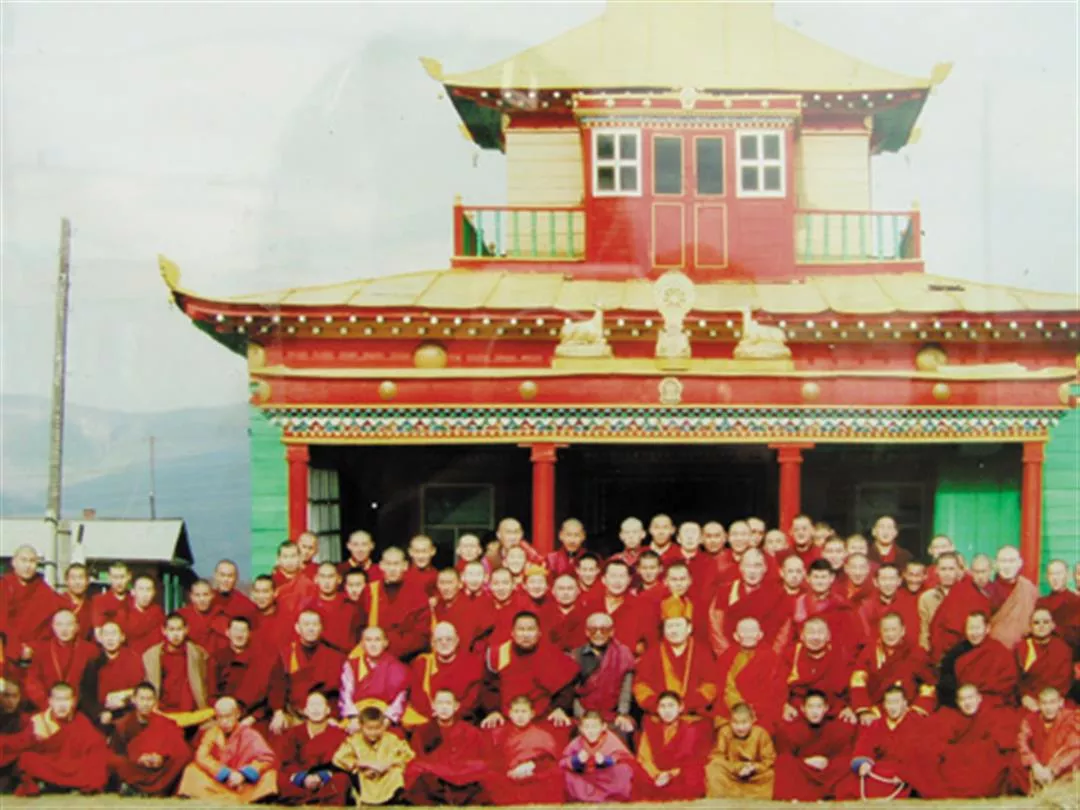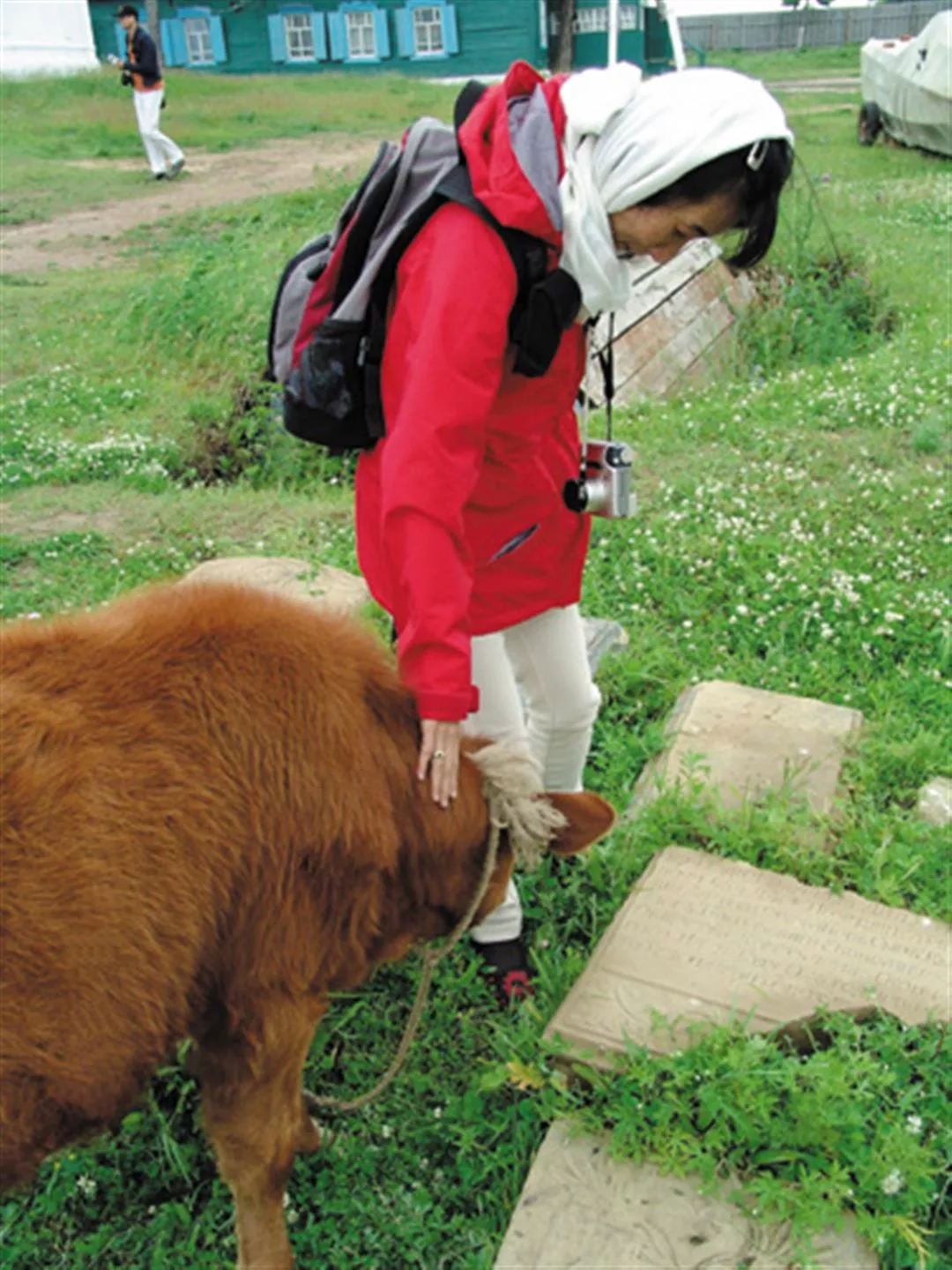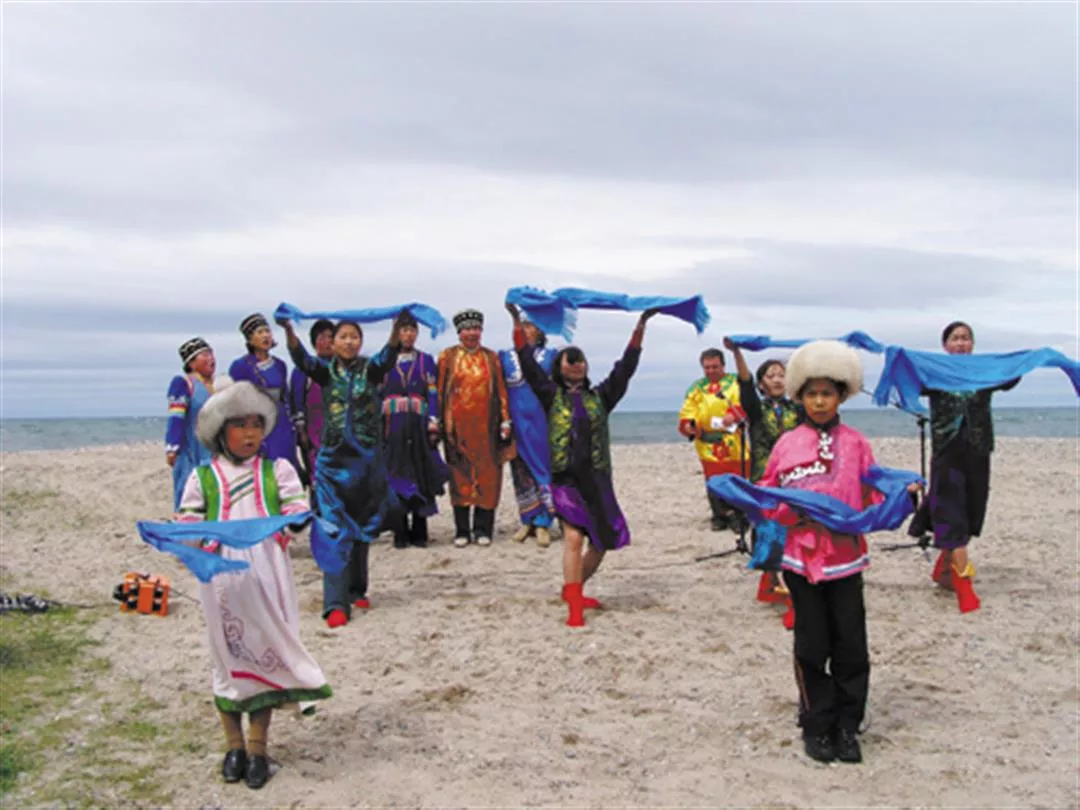The airplane slowly descended into Ulan-Ude, the capital of the Russian Federation's Buryat Republic. Though it's the region's administrative, political, economic, and cultural center, the third-largest city in Siberia, and one of the oldest cities in the East, it has none of the hustle and bustle of a big city. With only 400,000 residents, how could it? That's smaller than the seat of any one of Taiwan's counties. Not only that, but the population is spread out over such a wide area--there's so much land, it seems like they'd just give it away. You don't see many tall buildings as there's not much need for them. You don't see many people walking around on the streets, either. There are no flashy neon signs. The place is as plain and simple as a country maid. Every once in a while, a car or bus will go by, shattering the silence.
Standing by the side of the road, I couldn't help but wonder--is this really Russia, or is it Mongolia? (According to legend, the mother of the Mongolian national hero Genghis Khan was born around here.) Maybe this was the stomping grounds of the Xiongnu, those nomadic adversaries of China? Though I knew the Buryat Republic was one of the three Mongolian republics in the Russian Federation, I felt as if I had entered a time warp. I imagined myself heading for Lake Baikal to visit Su Wu, the loyal Han official who was held captive by the Xiongnu for 19 years.
But how can people be so forgetful? They all say Ulan-Ude was built in 1666 by the Russian Cossacks. When I mention the Han Dynasty and the Xiongnu, Europeans and Americans with me have no idea what I am talking about. Don't they know about this chapter of history?
If it weren't for the Trans-Siberian railway coming through here, this remote place would be even more lonely. Trains started coming through on August 15, 1899, and since then, factories for making machine parts, glass, and construction materials, processing foodstuffs, and even manufacturing airplanes have been built here, adding to its traditional farming, forestry, and livestock industries. So even though it's a remote place, the people here can make a living. There are no beggars or peddlers on the streets. Nowadays, there is even a tourist industry.
"We get quite a few Taiwanese tour groups coming through," said our guide upon learning I was Taiwanese. "They come over after going to Mongolia," she explains as she notes the doubtful expression on my face.
That may be the case, but this far-off outpost is thousands of miles away from Moscow, and the local infrastructure is backward compared to that of other cities. A bridge over a river at a major traffic artery has been incomplete for many years. Work stopped when it was only one-third finished, and now it makes for an odd sight, reaching out into thin air. I asked a local guide when it would be opened to traffic. She shrugged and looked to the sky, in an expression that said, "Heaven knows!" The patient locals just have to wait for the hourly ferry to take them to the other side.
In any case, the residents here don't have the freedom to move away. Our guide, Elena, spoke fluent, American-accented English, and had spent two years in the States studying and working. Her talents were really going to waste out here in her hometown and she wanted to move to Moscow to try her luck there, but she couldn't do it. To move to Moscow she would need a residence permit, and those were difficult to come by. Perhaps she didn't have the cash to bribe the right officials. She'd been waiting for years without the paperwork coming through. She said indignantly, "I was born and raised in Russia, but I need a visa to travel in my own country. They treat us like second-class citizens! Would China do this to us? We'd be better off if Ulan-Ude was handed over to the Chinese!" I couldn't say anything. It seemed that Russia had let her down and that China represented some fantasy to her. Actually, she looked Asian--it's no wonder she had some unconscious sense of identification with China.
Elena, whose ancestors were from Mongolia, found herself stuck here, just as Su Wu was, waiting for the day she'd be able to leave. When Su Wu left on his mission to meet the Xiongnu, he was a strapping 40-something high official from cosmopolitan Chang'an. Little did he know he'd be held by the Xiongnu, forced to herd a flock of rams and told he'd only be released when one gave birth. He had to make shelter in the snow, and as the Xiongnu didn't provide food, he was forced to forage grass from rats' nests--a prouder man would have died in such conditions. He used his imperial messenger's staff as a shepherd's rod. The Han emperor had forgotten him. Nineteen years later, when he returned to Chang'an, people saw a wizened, bearded Su Wu still holding his imperial staff. The sight moved everyone to tears.
Lake Baikal (or, the "Northern Sea," as it was called by the Chinese) is around 75 kilometers from Ulan-Ude. Leaving the city by car, there are few signs of habitation. The sight of a Buddhist temple only makes the scene more desolate--it's said to be the biggest one in all of Russia, but it doesn't look like much to me. It isn't very impressive, and you could even say it was a little spartan. There are no clouds of incense smoke, and few believers. There are, however, quite a few monks inside.
The temple is said to have been built in 1946, during the reign of Stalin. A few years ago, the Dalai Lama even paid a visit. But the Communist Party is supposed to be atheist--how could a Buddhist temple have been permitted in the Soviet Union? Our guide told us that this was a rare exception to the atheist standard. I found it hard to believe that Stalin would give Buddhism any special treatment, and suspected his motives were political. The people of the Buryat Republic are for the most part ethnic Mongolians who follow Lamaist traditions, and Stalin must have softened his policies in order to win them over. The Mongolians are the only people to have conquered the Russians. Their Golden Horde ruled this area for 240 years--maybe the memory somehow persists, and the Russians still don't dare to push too hard around here!
From the temple, it's not too far to Lake Baikal. The roads in Russia are in poor condition, and you have to drive rather slowly or risk being thrown all over the car. Though it's a sunny July day, it doesn't really feel like summer. When we get out of the car, a cold wind hits us and we can only wonder what winter is like around here.
I imagine a bone-chilling wind and a sky full of flurrying streaks of white snow over a vast expanse of white ground. I picture a gray-haired old man with a staff in his hand standing motionless by the lake. Only a few strands remain from the whisks of his staff. They whip in the northern winds, as does the man's wispy beard. I am lost in my thoughts until the sound of drums brings me back. A group of musicians and dancers in traditional garb march onto the scene. I am startled--have the Xiongnu come?!?
It's a big group, with 20 or 30 men and women of all ages. Their performance must have been arranged by our tour organizer--they've been waiting at the lakeside. After a little girl presents the special bread traditionally offered to guests, the performance begins in earnest. As I watch them, I analyze their faces. They have wide foreheads and large faces, yellow skin, and black hair--they must be of Mongolian extraction. Su Wu is long gone, and 2000 years have passed in a flash. There are no Xiongnu here now to strike fear into the Han Dynasty. Other conquerors of the East, the Mongolians, have taken this land.
I only stand at the side of the lake for a little while--the wind is too strong. I learn that it's not only because the open plains present no barrier that the wind is so strong. The main reason is the vastness of Lake Baikal. It's no wonder that it was once called a "sea." The "Northern Sea" is actually the world's deepest (at up to 1940 meters) and most ancient freshwater lake. When the wind blows, the powerful waves on the lake are like those seen in the ocean. It is at the side of this vast, bleak lake where Su Wu spent 19 years.
Nineteen--that number seemed to be a turning point for me, too. That's when I understood that there was no turning back, and began to give up the idea of returning home. I married a man from far away, and after 21 years I have finally accepted that I might end my days in a foreign land. Su Wu was forced to remain here, while I chose my exile. I could always go home for a short visit, but he was without hope. What did he put his belief in to see himself through?
"Su Wu! Su Wu!" I call out his name in my mind over and over. The only answer I hear is, as ever, the wind.

The Buddhist temple at Ulan-Ude, capital of the Buryat Republic, is the largest in Russia. The many lamas line up for a photo.

Su Wu herded sheep, but nowadays there are more valuable cattle here. Calves are tame and approachable. Do they too struggle in this cold and barren land?

Local people perform traditional songs and dances around Lake Baikal. Could Su Wu have seen such a sight so many years ago?